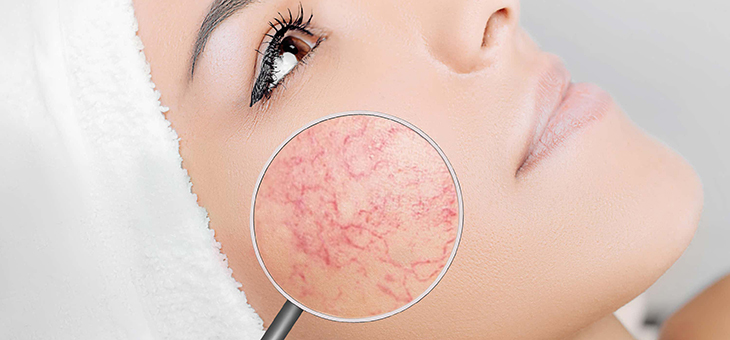Everyone has bad skin days. But if the flush you get after a few glasses of wine has developed into a persistent redness, you could have rosacea.
The common inflammatory skin condition causes a telltale rosy hue to the cheeks, as well as visible blood vessels, dryness and bumpy skin texture.
What is rosacea?
Rosacea is a long-term skin condition, which means that although there’s no cure, it can be managed well to minimise the effects on the skin, says skin expert Natali Kelly.
“It’s most common in women and manifests itself as flushing redness or red pimples. The nose, cheeks, forehead, chin and chest are most commonly affected, and the redness can also be accompanied by a burning or stinging feeling, causing discomfort.”
She continues: “Rosacea can also cause a thickening of the skin, usually on and around the nose.”
It’s a very different condition from acne, too. “Rosacea and adult acne are two distinct skin conditions, but they do have similarities, so it’s easy to confuse the two,” says consultant dermatologist Dr Adam Friedmann. “Rosacea sufferers may have pimple-like breakouts but, unlike acne, they won’t consist of blackheads.
“Blood vessels are also more likely to be visible in rosacea sufferers, whereas in acne patients, the redness tends to be around the breakouts only.” If you’re in any doubt, he says it’s worthwhile seeing a dermatologist for an expert diagnosis.
Do we know what causes it?
The root causes of rosacea are not fully understood, according to consultant dermatologist Dr Alia Ahmed.
Read more: How stress can affect the skin and what to do about it
“It’s likely multifactorial and includes immune dysregulation, neurovascular changes, microbial imbalance and genetics. Rosacea is a female predominant condition, and this may be due to female hormone imbalances acting as triggers.”
Lifestyle and dietary choices can also trigger the symptoms of rosacea, so it’s important to figure out what might be irritating your skin. “Triggers can include exercise, stress, eating hot and spicy foods, alcohol consumption, caffeine intake, hot drinks and for some, cheese,” says Ms Kelly.
How can it be treated?
With sun exposure being one of the biggest triggers for rosacea, it’s important for people who are affected to limit their exposure to sunlight and use SPF 50+.
Dr Ahmed adds that you should “use gentle cleansers to wash your face in the morning and evening” and to “avoid greasy moisturisers”. She recommends Effaclar H cleansing cream by La Roche Posay.
Read more: Treating common skin conditions
“Remove any make up with micellar water, consider supplements that include probiotics, collagen and omega-3 fatty acids, and if stress is a trigger, try to manage the issue with mindfulness or talking therapies,” she adds.
A dermatologist may also prescribe a combination of antibiotic and antiparasitic creams, oral medication and topical retinoids, to help soothe the skin.
“If your skin isn’t improving, despite using a skincare regime and medical treatment, or if you are having frequent flares, you should consider reviewing treatment with your dermatologist,” says Dr Ahmed.
“It’s always worth discussing with your healthcare practitioner the way your skin condition is making you feel and the impact it has on your life too, as rosacea can also cause knock-on psychological effects, like low self-esteem, embarrassment and emotional distress.”
Read more: How menopause affects skin
Your GP can point you in the direction of talking therapies and mental health services, should you need them.
Do you suffer from any skin conditions? Do you have a daily skincare routine that helps? Share your favourite product in the comments section below.
– With PA
If you enjoy our content, don’t keep it to yourself. Share our free eNews with your friends and encourage them to sign up.
Health disclaimer: This article contains general information about health issues and is not advice. For health advice, consult your medical practitioner.

